
Annual Survey 2022: The Results
CLAPA’s Annual Surveys are designed to give us a snapshot of your needs, priorities and concerns. As a small charity, we must plan carefully to focus our limited resources where they’ll make the greatest impact. By completing this survey, you’ve helped us make sure our plans include you!
This isn’t the only way we get feedback from our community. We read every feedback form you submit and take your emails, comments and posts on social media into account. We also use groups like CLAPA Voices to give us opinions on a wide variety of topics. Your feedback can help us shape CLAPA into a charity that meets your needs, so please get involved whenever you can.
We hope you enjoy this summary of our 2022 Annual Survey results.
Who Took Part?
229 people responded to this survey; that’s double last year’s number!
63% were parents and carers, 33% were adults born with a cleft, 1% were 16-17-year-olds, and the remaining were grandparents, partners and other relatives.
Children’s Age
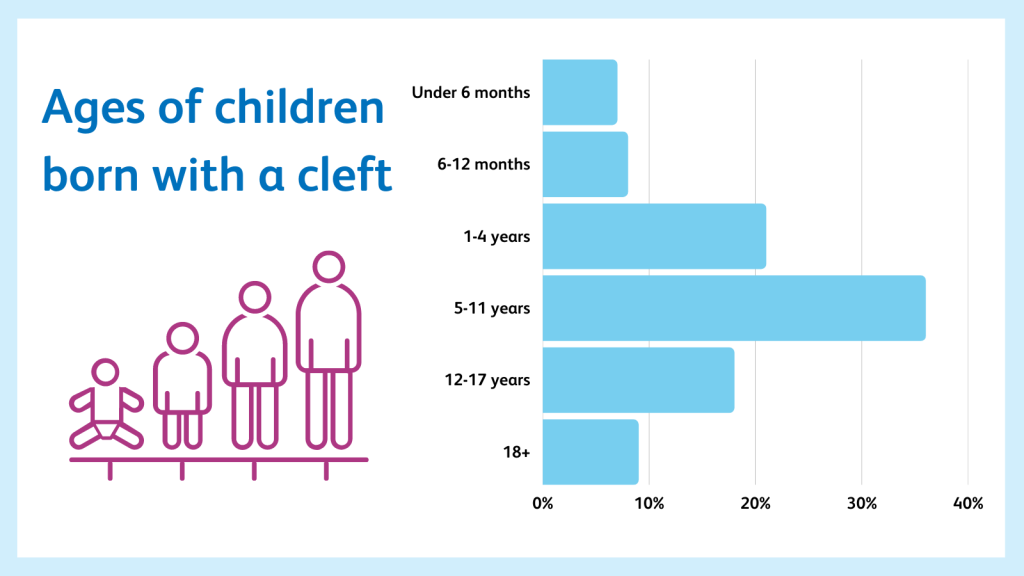
Of the parents and carers who responded, 15% had a child under a year old, and the largest group was those with 5-11-year-olds, who made up 36%. Only 9% had a child over 18 years old.
Compared to previous years, this shows that more parents and carers are continuing to stay engaged with our work as their children get older. We’re working hard on developing new services to support these age groups, so we hope these parents and carers will continue to stay involved to help us make these as effective and impactful as possible!
Type of Cleft
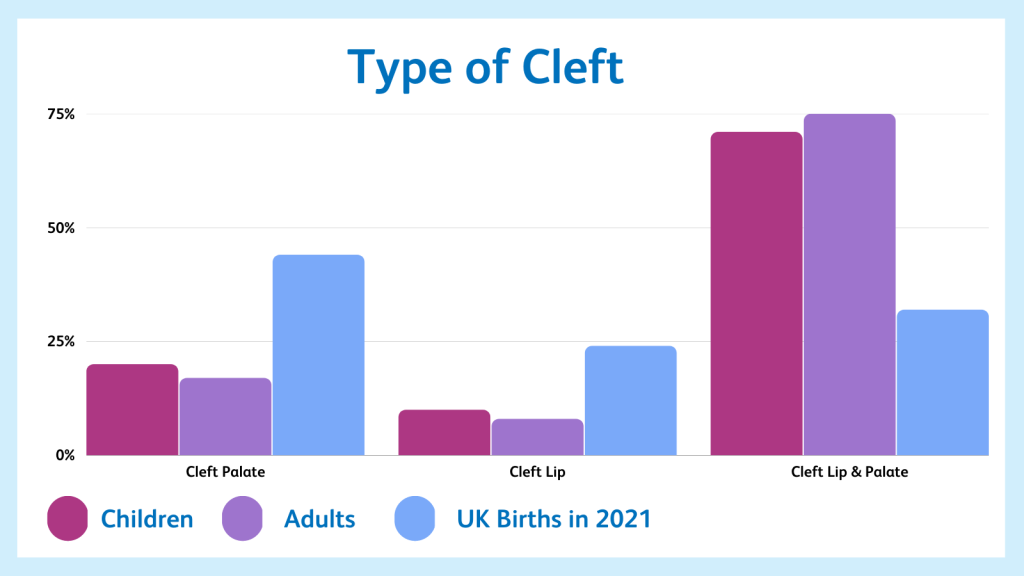
When it comes to cleft type, the largest group was cleft lip and palate, which made up 65% of children and 73% of adults. This is similar to the year before. Only 18% of children and 16% of adults had an isolated cleft palate, up from the 6% we found last year.
These numbers do not match the wider UK cleft population – this is shown in blue in the above graphic. The incidence of different cleft types in all babies born with a cleft in the UK is pretty similar each year, with around 45% born with a cleft palate, 25% with a cleft lip, and 30% with a cleft lip and palate. See the latest CRANE report for the numbers used in blue in the above graph, compared to the pink and purple numbers from our survey results.
It’s clear from our survey results over the years that people born with a cleft lip or an isolated cleft palate are under-represented, while people with a cleft lip and palate are over-represented. We’re not sure if this is the same for our wider service users, but if so, it’s a cause for concern. In future surveys, we’ll make sure to ask these groups what we can do to make sure our services are more relevant and welcoming for them.
Location
Respondents were from all over the UK, with most local authorities being represented. The most-represented areas were the South East of England (including London), Central England, and South West South Wales.
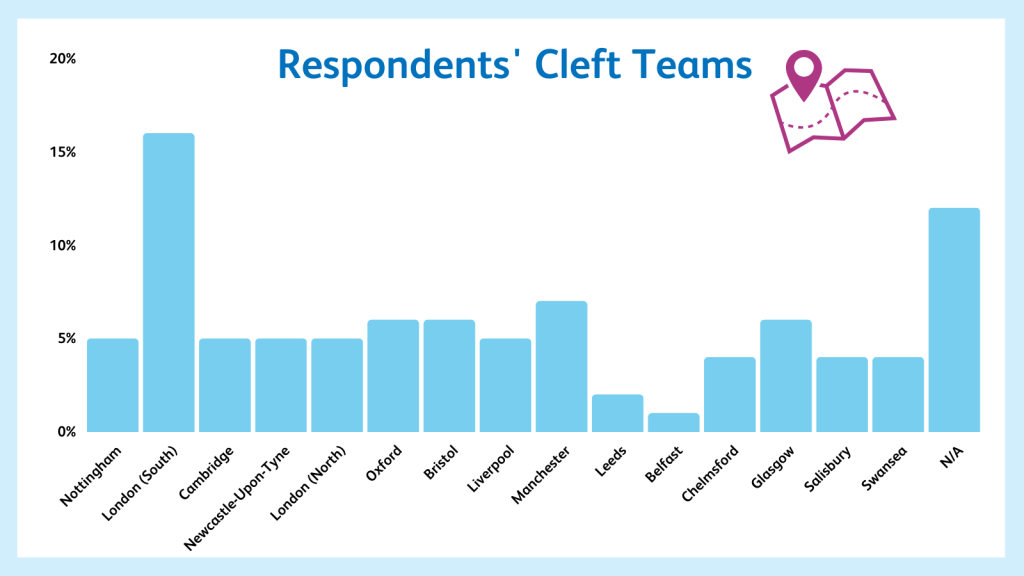
We also asked respondents which Cleft Team they were currently under. Responses were roughly in line with population distribution, though South London (Guys & St Thomas’ Hospital) was over-represented, while we had very few respondents from Northern Ireland/Belfast.
Demographics
The people responding to this survey were mostly female (86%; 2021: 89%), White British (87%; 2021: 93%) and identified as Straight (93%; 2021: 94%).
Most identified as either Christian (50%) or no religion (47%).
The largest age groups were 35-44 (35%), followed by 45-54 (22%) and 25-34 (21%).
15% said they had a disability or long-term health condition (not including cleft).
13% said their household was experiencing either short-term (7%) or long-term (6%) financial hardship.
This shows that not everyone in the cleft community is represented in these survey results.
Our Diversity and Inclusion Committee are always working to ensure more people feel involved and engaged in our work, but we always want to hear from you if you have suggestions on how we can make CLAPA a more inclusive and welcoming space for everyone affected by cleft. Contact us (anonymously or otherwise) with your thoughts, or join CLAPA Voices to be consulted on research and policy decisions.
Your Top Concerns
We asked parents and adults born with a cleft what their top concerns around cleft and cleft care were at the moment.
Parents & Carers
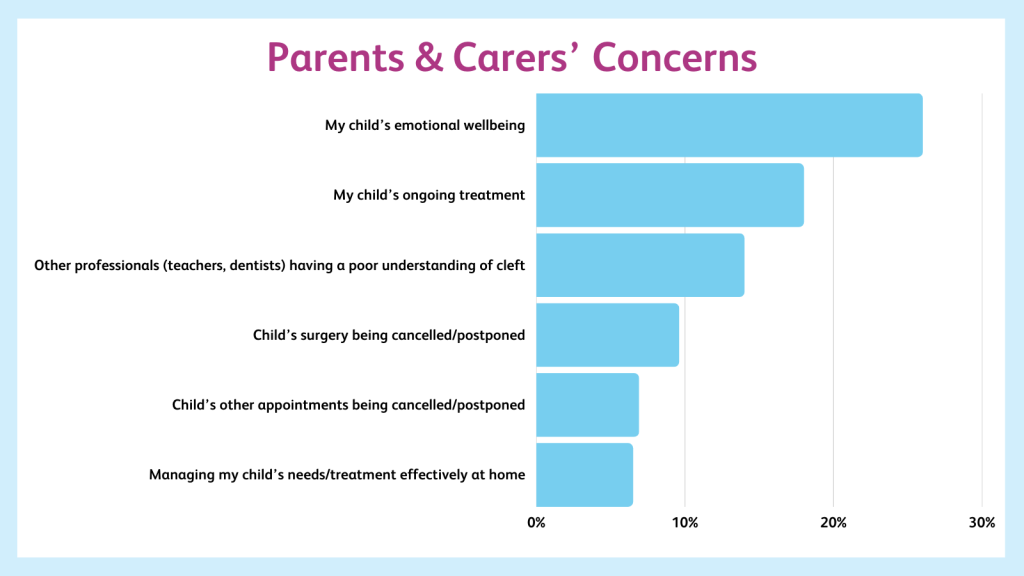
The top concerns for Parents and Carers were:
- Child’s emotional wellbeing (26%)
- Child’s ongoing treatment (18%)
- Other professionals responsible for my child having a poor understanding of cleft (14%)
- Child’s surgery being cancelled/postponed (10%)
When we asked for more information, the key themes were:
- The pandemic and other issues within the NHS are having an ongoing impact on cleft care, leading to delays, cancellations and less joined-up care. Parents and carers felt like communication had worsened and that it was harder to get the answers they needed.
- Non-specialist dentists, GPs and teachers have a poor understanding of cleft, which can have a negative impact on the support children and young people receive.
- Parents and carers were very concerned about how to support their children when starting or switching schools, and how to make sure they were confident and resilient enough to cope with comments about their appearance or speech.
Adults Born with a Cleft
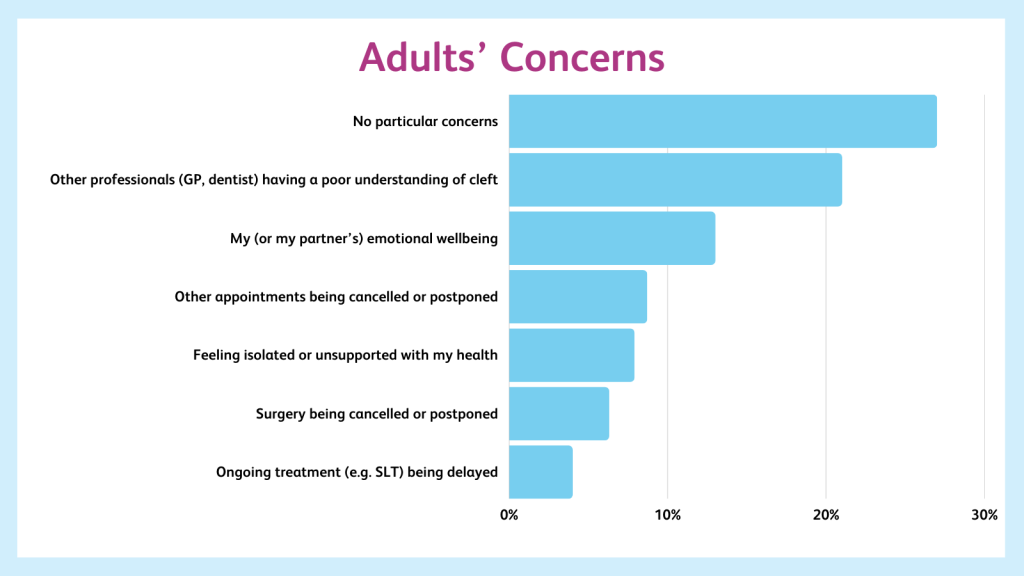
The top concerns for adults born with a cleft were:
- Other health professionals (GP, dentist) having a poor understanding of cleft (21%)
- My (or my partner’s) emotional wellbeing (13%)
- Other appointments (not surgery) being cancelled or postponed (8.7%)
- Feeling isolated or unsupported with my health (7.9%)
When we asked for more information, the key themes were:
- A lack of available or affordable dental care
- Long delays in cleft care leading to issues going unaddressed
- Lack of knowledge and tact from generic health professionals
CLAPA’s Response
While many of the above concerns are caused by factors far outside of our control, we’re doing all we can to address these issues through new resources and events planned for the next few years.
We work closely with the NHS Cleft Teams and have reported back on these results. We regularly raise issues like these with the NHS Cleft Teams to see what kind of support CLAPA can provide.
A number of resources are currently in development to help parents and carers better support their children at school and to advocate for them in non-specialist healthcare settings. Other resources in the pipeline will be put to a community vote very soon to ensure we’re focusing on the topics that matter most to you.
CLAPA’s Services
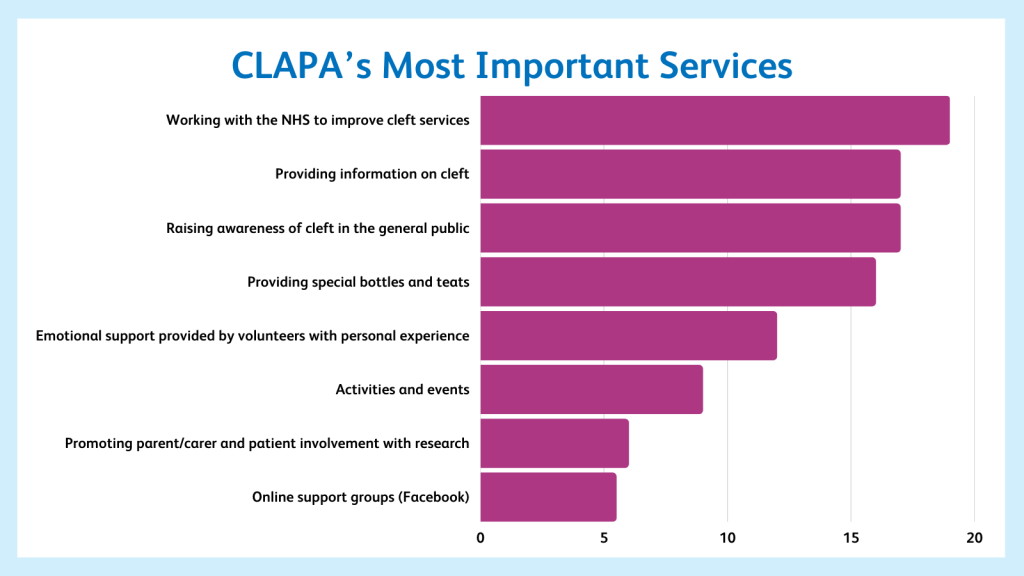
We asked you which of our charitable activities were most important to you personally. We ask this every year to see how your responses change over time. The results were very close, showing how much all our activities were valued!
The highest-valued services were:
- Working with the NHS to improve cleft services
- Providing information on cleft
- Raising awareness of cleft in the general public
- Providing special bottles and teats
This is roughly in line with previous years, though there has been a noticeable increase in how much our work with the NHS is valued since the pandemic. This reflects the difficult situation of the health service at the moment and how this has impacted on those needing specialist care and their families.
Given the disruption caused by the pandemic, it’s no surprise to know that many people are concerned about what the future may hold. CLAPA will continue to develop our close relationship with the NHS Cleft Teams, and do all we can to ensure your voices are heard.
As for research, we’ve made big strides in this area in the past year! If you’re interested in finding out more, join CLAPA Voices to be the first to hear of opportunities to get involved in research as well as the development of CLAPA’s work.
What are the barriers to accessing CLAPA’s services?
It’s extremely important to us that our services are accessible and inclusive of everyone who might benefit from them, regardless of their background or situation.
With this in mind, we asked people if there were any services which they were interested in but hadn’t ended up using in the previous year.
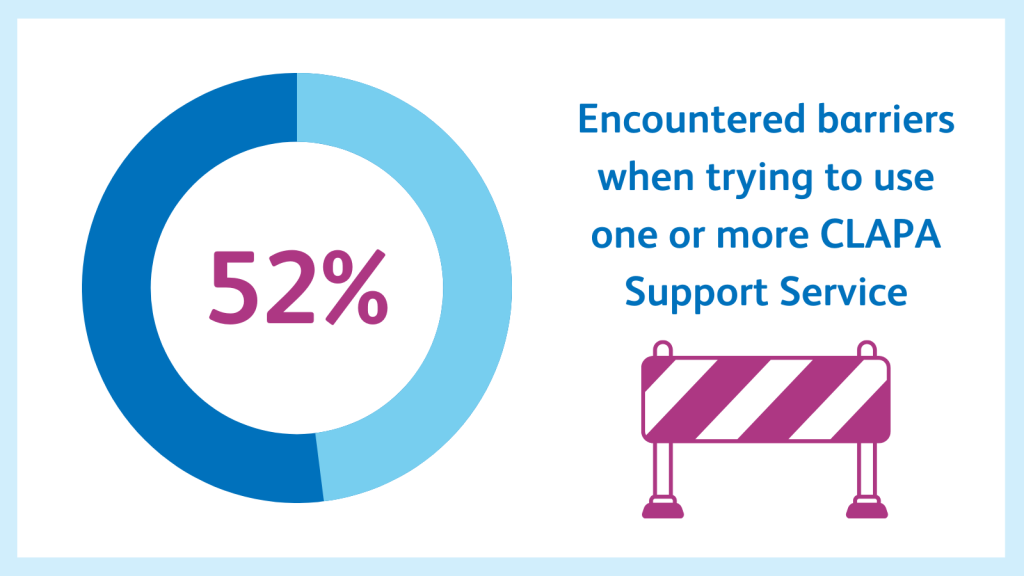
While 48% of people said they used all the services they wanted to, that meant over half of the respondents faced a barrier to using our services, including:
- Online events (11%)
- Live Q&As (6%)
- Sharing my photos or story with the cleft community (5%)
- Peer and Parent Support Service (5%)
When we asked why they hadn’t ended up using the service, we got some very useful feedback, such as:
- The timings of events didn’t work for certain groups
- We’re looking at the timings of our events to try and give more people the option to join
- People worried about being emotional on camera or talking to others
- There’s no pressure to have your camera on or talk at our events – you are absolutely welcome to come and just listen and can leave whenever you need to.
- Some people felt their cleft was too ‘minor’ or their journey too unremarkable to share, even though they wanted to.
- Your journey might not seem interesting to you, but every story of someone affected by cleft is valuable and worth sharing. If you want to share yours, we want to hear from you! This is especially true for research projects; you might not think you have much to say, but it’s so important that researchers get a full picture of the experiences of people affected by cleft, and that includes you!
- There was uncertainty about what was involved with some services, and worries around this led some not to seek out further information
- We’re looking at how we talk about certain services to make sure the procedures are really clear and answer all the questions people might have.
We’ve already started to address some of these issues in how we run and talk about our services.
Please keep sending us your thoughts (anonymously or otherwise), as every one of these comments helps us to make these services more inclusive and accessible for all.
Cleft Research
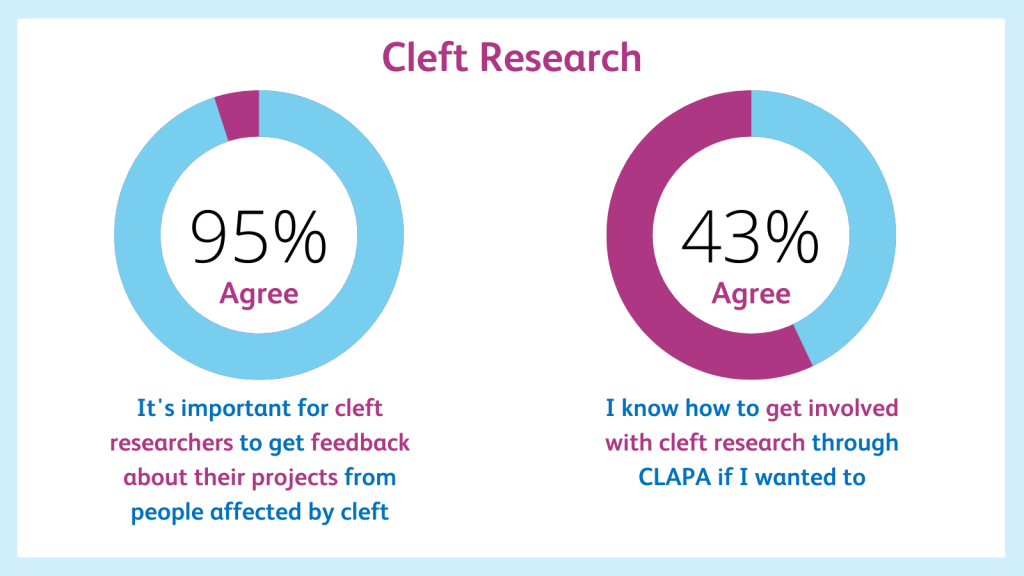
95% agreed it was important for cleft researchers to get feedback about their projects from people affected by cleft.
Interestingly, only 70% agreed that they would have more confidence in a cleft research project if they knew people affected by cleft were involved in its design.
Less than half the people we asked (43%) agreed they knew how to get involved with cleft research through CLAPA.
We’ve changed a lot about how we run our work with researchers and get feedback in the past two years, so it’s very useful to see how this has come across to the community. We think that for the community to truly understand how valuable their contributions can be, they should have the chance to read the results of this kind of research, and we hope that, once we’re able to start publishing these, more people will want to get involved.
If you’d like to get involved with cleft research, join CLAPA Voices to get relevant opportunities in your inbox.
CLAPA Events
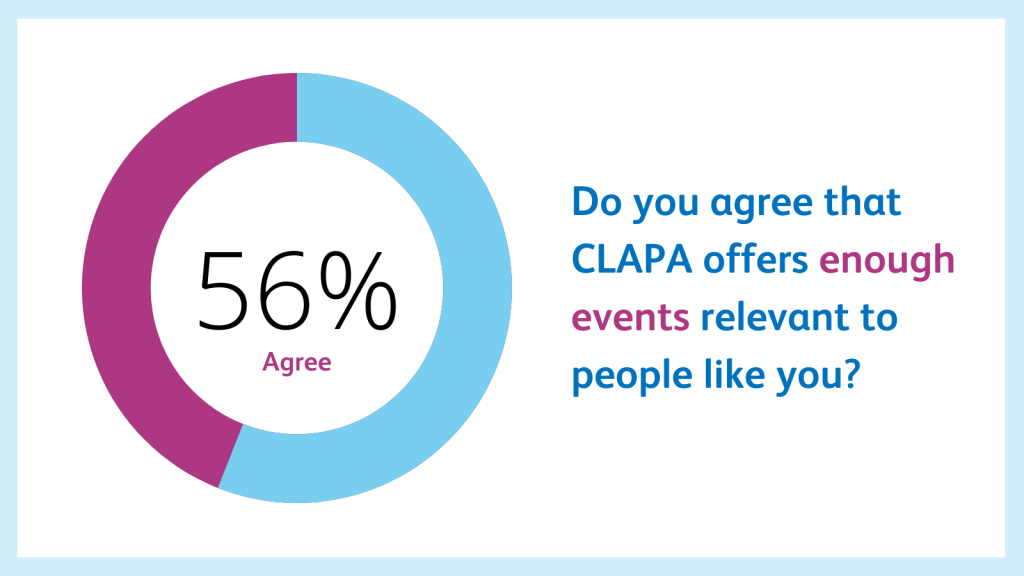
More than half of respondents (56%) agreed that CLAPA offered enough events relevant to people like them. Parents and carers were more likely to agree to this (59% vs 48% of adults).
When asked what they valued about CLAPA events, parents’ and carers’ top responses included:
- Their child interacting with other children born with a cleft
- Hearing other parents/carers talking about their experiences with cleft
- Learning about specific parts of the cleft journey (e.g. surgery, starting school)
- Sharing their own experiences with cleft to support other parents/carers
- Their child doing something fun but still connected to their cleft
Adults’ top responses included:
- Hearing others like me talking about their experiences with cleft
- Sharing my own experiences with cleft to support others like me
- Learning about specific parts of the cleft journey (e.g. adult surgery, dental care)
- Talking about my concerns and getting support from others like me
- Being able to join an event without directly participating
We also gained some useful feedback about when would be best to schedule events and what we could do to make our events more inclusive and accessible for them.
Our online events programme is constantly evolving to better meet your needs, both in terms of what we cover and how the events are run. It’s good to know that the core of our events – giving people the chance to talk to others like them – is still of so much value to so many people.
About CLAPA
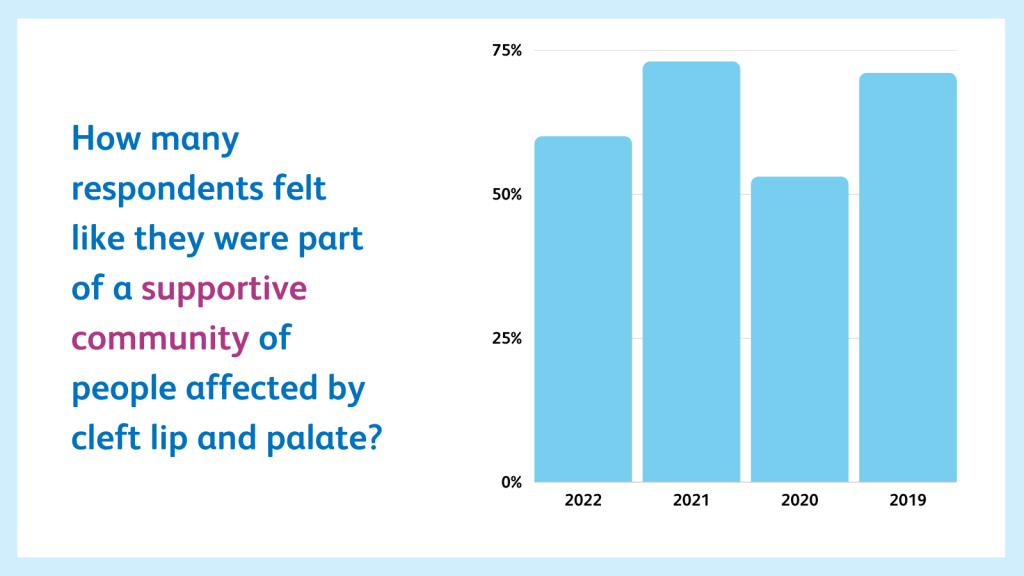
In every annual survey, we ask, ‘do you feel part of a supportive community of people affected by cleft lip and palate?’
In 2022, 60% of people agreed, down from 73% in the previous year.
A further 17% said they didn’t feel they needed one, while nearly a quarter (23%) said that while they didn’t feel like they were part of a supportive community, they would like to be. Adults were a little more likely than parents to say this, but nothing else stuck out when we looked at the demographics of people who answered this way.
The term ‘supportive community’ might mean different things to different people. For some, it’ll be a known group of people they can talk to personally about the ups and downs of their cleft journey. For others, it could be just knowing that there are others out there going through the same thing. Whatever the definition, we want to ensure that everyone in the UK who wants a ‘supportive community’ has the chance to find one through CLAPA in a form that works for them.
Accessibility, Inclusion and Diversity
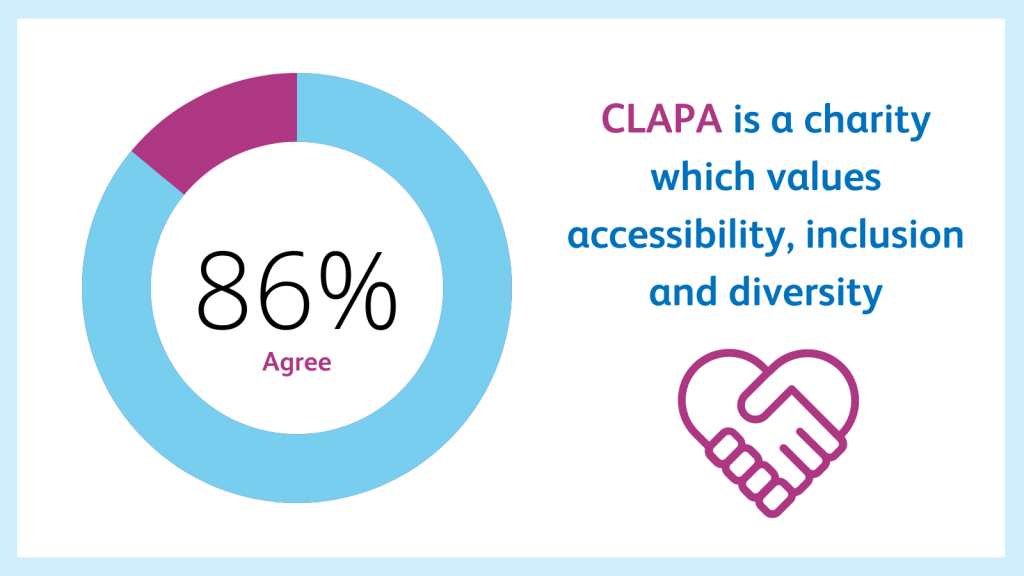
It’s important to CLAPA that everyone who might benefit from our services has the chance to use them. To do this, we want our community to know that we’re a charity which values accessibility, inclusion and diversity so that they feel confident when raising concerns and giving suggestions.
With this in mind, it was wonderful to see that 86% of people agreed that CLAPA valued accessibility, inclusion and diversity, with over half (52%) strongly agreeing. A further 13% were unsure, leaving 1% of respondents who disagreed.
We’re doing our best to make this ‘100%’, but as a small team, we can’t do this without your help. If you have suggestions on how we can do better, please get in touch.
Content from CLAPA
Our social media channels and e-newsletters are a big part of how we’ve created a UK cleft community. We asked respondents to tell us what kind of content from CLAPA they’d like to see more of.
The most popular kind of content was:
- Information about cleft research results
- Information about CLAPA’s services and events
- Written case studies and stories from people affected by cleft
- Information about getting involved with cleft research and/or influencing cleft services
When we asked if respondents felt like the content they saw from CLAPA reflected them and their connection to cleft, 84% agreed, with 39% saying ‘totally’ and 45% saying ‘a little’. Only 5% disagreed, with 11% saying they weren’t sure.
Suggestions to make content more relevant included:
- A wider range of cleft types and age ranges
- Content for older adults born with a cleft
- More content for older children and teenagers
- More of a spotlight on cleft palate
- More representation of the different conditions associated with cleft
- Testimonials and more information about CLAPA’s services
Feedback like this is extremely useful and has fed into our plans for the coming years.
We’re always keen to feature a wider variety of stories from the cleft community. If you’d like to help us by sharing your story, please get in touch!
NHS Cleft Services
We asked if respondents had experienced any issues with accessing NHS Cleft Services in the past year and if these were minor or major issues.
Overall, there was good awareness of all the services, and most people could access what they needed with no issues. There has been a particular improvement from the numbers we saw in 2020 and 2021, which is unsurprising given the circumstances.
However, there were worrying results for several services. It’s important to note that, although we asked about ‘Cleft Services’, the comments added to this question suggested that respondents mostly had issues finding care outside of their NHS Cleft Teams (such as local dental or SLT services). In most cases, issues with NHS Cleft Teams reflected wider issues with local NHS care, such as a lack of surgical time or beds in particular hospitals.
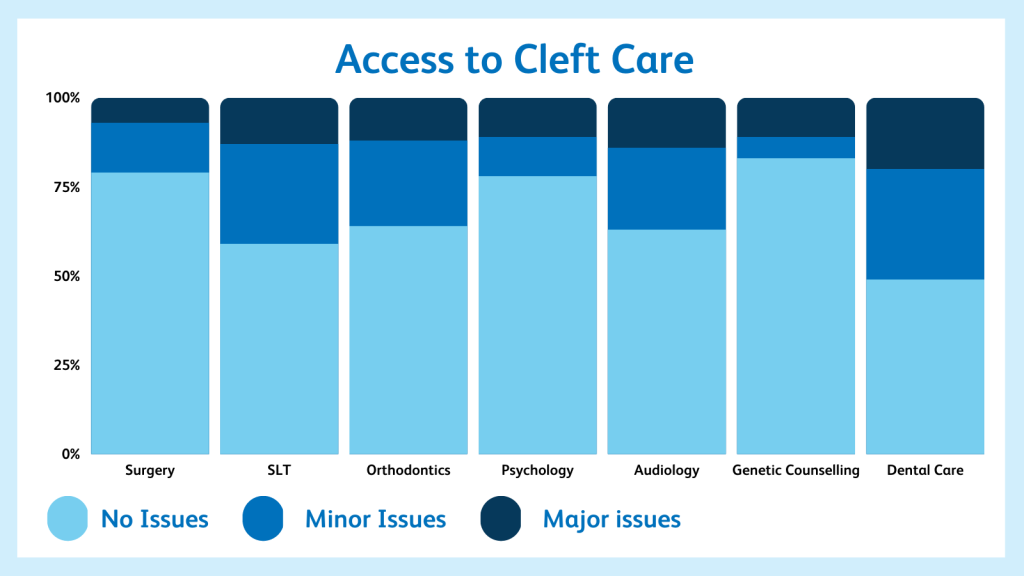
Dental care was the most problematic service. Of all those who attempted to access this last year, only 49% could do so with ‘no issues’. 31% ran into minor issues, and 20% reported major issues.
This matches the anecdotal reports from people all over the cleft community struggling to get the dental care they need. Problems range from local dentists not understanding cleft to ‘dental deserts’ where there are simply no NHS dentists available in certain areas. Long waiting lists and prohibitively high costs for private care mean many people are not getting the treatment they need.
In the past, this has been more of an issue for adults born with a cleft in need of restorative treatment, but this year we’ve found the numbers are similar for adults and parents/carers, showing that access to dental care is troubled across the board.
Speech and Language Therapy was also highlighted as an issue, with 41% of people having issues with access. Orthodontic care and Audiology were just beneath this, with 36% reporting access issues. Again, these match the anecdotal evidence of long waiting lists, cancellations and other delays as the NHS struggles to recover from the pandemic.
As with previous years, the least-known service was ‘Genetic Counselling’, though it’s good to see the people reporting they didn’t know about this dropped from 14% in 2021 to 9% this year.
We asked respondents to tell us more in the comments and gained a huge amount of helpful information, which we’ve used to plan for future resources. In particular, it was wonderful to see a lot of adults born with a cleft giving us useful insights into the barriers they’ve faced when accessing treatment.
We also heard from a lot of parents and carers about the ways in which we could support them to feel confident and knowledgeable when advocating for their children and navigating the treatment pathway.
What’s next?
This survey has directly fed into our planning for next year, and CLAPA would like to thank everyone who took the time to complete it!
If you have any questions or concerns about the survey, please get in touch. The next annual survey will launch in September 2023, but in the meantime, there are plenty of feedback forms, polls and comment boxes waiting for your input. We really do read and value every bit of feedback we get, so thank you for helping us to make our services better for everyone affected by cleft in the UK!


